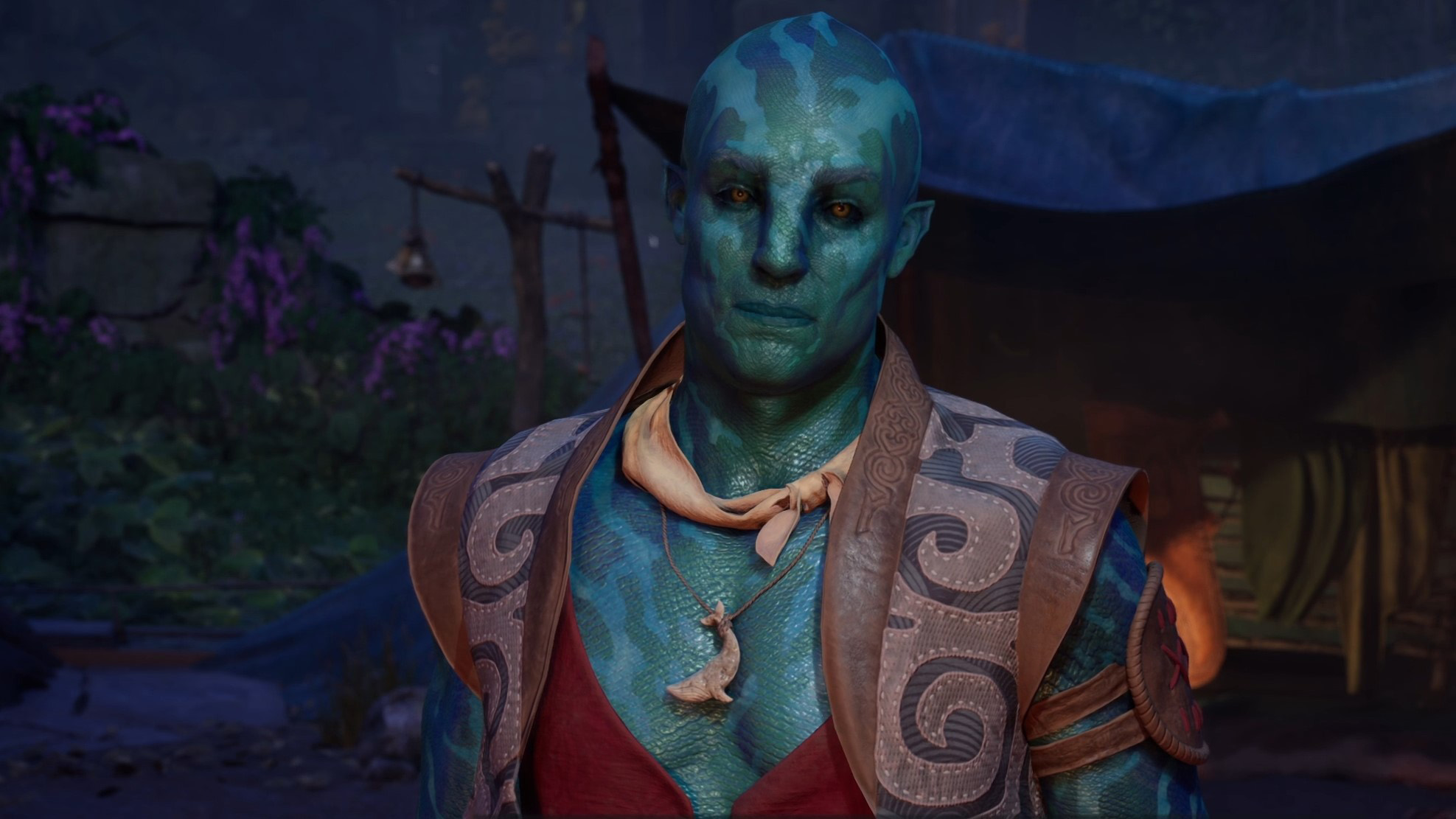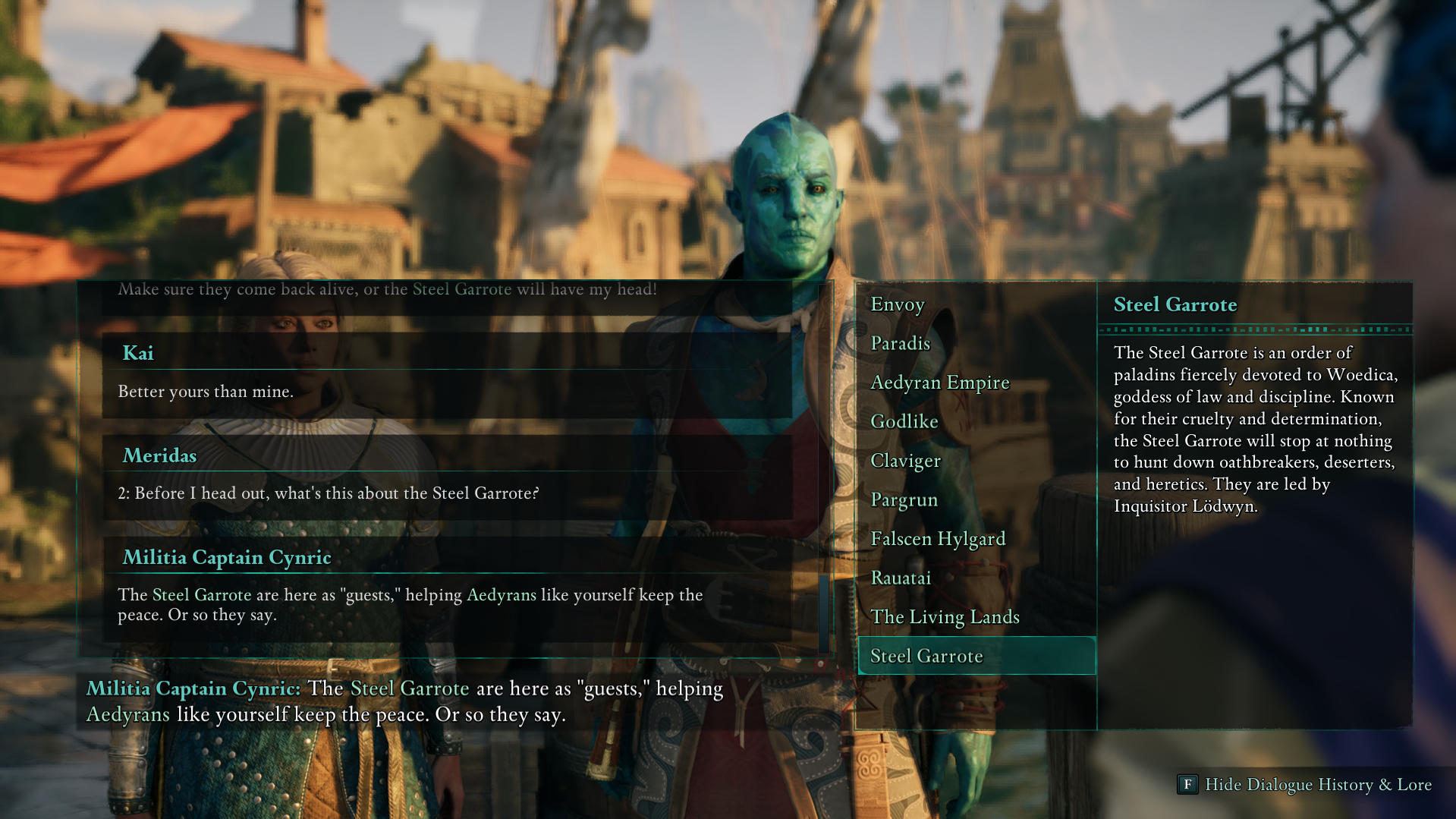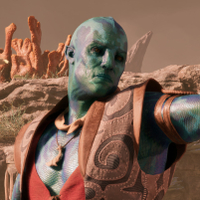Avowed's in-dialogue glossary isn't that new, really—it's just somehow not industry-standard yet, though it could solve the 'amnesiac/prisoner RPG protagonist' problem forever
If someone says "wow, you must've hit your head hard" one more time, I'm gonna lose it.

Words cannot describe how much I love Avowed's glossary of, well, words. In case you've not been playing Obsidian's excellent little RPG yet, the game has a "dialogue history and lore" option you can pull up whenever someone's not actively yapping, which'll not only let you skim through previous dialogue. It'll also pull up a glossary of terms used in the conversation itself. This includes important organisations, figures, and fantasy terms like "Claviger". Here's an example:

This appears to be making waves in design spaces and gaming communities despite not necessarily being anything new. Tyranny and Pillars of Eternity 2 had similar systems, as do most of Owlcat's games. Supergiant's Pyre also had hyperlinks in its dialogue, as well. This is not the invention of the wheel, it's another brand of wheel packaged and rolled out to great, wheel-y success.
As for why? Well, it's not exactly an industry standard yet for… some reason. Mainline RPGs just haven't really caught on—even Baldur's Gate 3, perhaps the defining RPG moment of this entire decade, doesn't make good use of a pull-up glossary. Mind, it emulates D&D's TTRPG knowledge checks, but that's still applied pretty selectively, and it's not something you can reference at any time.
As for why it's not as ubiquitous as 'health potions are red' in mainline RPGs? I'll be honest, I haven't the foggiest. It is, admittedly, likely to be a bit of extra busy work. Avowed's neat take on it applies terms to your per-conversation glossary as they come up, which I can't imagine is a simple coding feat. But games are already complicated to make, so I've never quite been taken by the excuse that 'it's a bit hard, so we'd rather not'.
This kind of glossary system is great for accessibility reasons, true. I have ADHD, and a barrage of new terms and names is the fastest way to get me to tune out—it's why, despite adoring Disco Elysium, I haven't finished the dang thing despite getting 10 hours or so into three separate playthroughs. At a certain point, my physical notebooks get too long, and I'm too stubborn to simply give over to my Disco Cop inner demons and fail at playing detective on purpose.
But I also think it's a genuine boon to the roleplay part of your RPG, too. Think about how many RPGs start you off as outsiders or amnesiacs. A prisoner on a boat or someone who just got conked over the head and lost their memories is a fun setup, but it also does the neat trick of aligning the player and their character's knowledge. I also don't mind it being used occasionally—the opening sequence in Oblivion is iconic.
However! It's such a relief to be playing an RPG where we don't have to have the "wow, you must've hit your head pretty hard!" or "that big space rock did a number on you" or "you must be new around here." I really appreciate being able to waltz in as a character who already knows that the in-universe equivalent of the Catholic Church exists.
The biggest gaming news, reviews and hardware deals
Keep up to date with the most important stories and the best deals, as picked by the PC Gamer team.
It fits well, here, too. You start the game as the envoy of an empire—meaning that, whenever an unfamiliar term gets dropped at your feet like a cat giving you a present, you can pull up your little mini-wiki to make sense of it. Then, you can actually have your character naturally express an opinion on something they should probably know about. Revolutionary!
I'm being a bit glib, but I also think there's plenty of room for experimentation, too. Imagine opening one of these notes, and having a description read: "You have no idea who this guy is" because you're unfamiliar. In fact, some indie RPGs already play in this space. Cyclopean: The Great Abyss, for example, allows you to gather topics from your experiences, then use them in conversation.
But I can also envision a game with a hidden 'term familiarity' score that's based on the background you have at character creation. Maybe you're from a hidden sect of monks, so the first time that sect's leader comes up in conversation, you already know all about it—not just by having a unique, tagged dialogue option come up, but by also having access to a full description of that person every time they're mentioned thereafter.
On the other hand, this system could actually enhance the more cookie-cutter amnesiac starting point. Imagine your character's increasing familiarity with a fantasy kingdom being mirrored by how easily the player can access that info mid-conversation.
And—look, you can make the argument that it's a little videogamey, but I don't know how to swing a sword, that's why we have hit markers, satisfying parry sounds, and slow-downs to make the whole thing more legible. This is just applying that logic to your character's assumed knowledge, and it works swimmingly. In summary—no, this system isn't novel, but it is weirdly non-mainstream, and I think it's about time that changes.
Avowed unique weapons: Grab these early
Totem of Rightful Rulership: Find all the pieces
Intimidating Feline Codpiece: Treasure map solution
Kai romance: Soldier through together
Avowed Ygwulf: How to handle the assassin

Harvey's history with games started when he first begged his parents for a World of Warcraft subscription aged 12, though he's since been cursed with Final Fantasy 14-brain and a huge crush on G'raha Tia. He made his start as a freelancer, writing for websites like Techradar, The Escapist, Dicebreaker, The Gamer, Into the Spine—and of course, PC Gamer. He'll sink his teeth into anything that looks interesting, though he has a soft spot for RPGs, soulslikes, roguelikes, deckbuilders, MMOs, and weird indie titles. He also plays a shelf load of TTRPGs in his offline time. Don't ask him what his favourite system is, he has too many.


